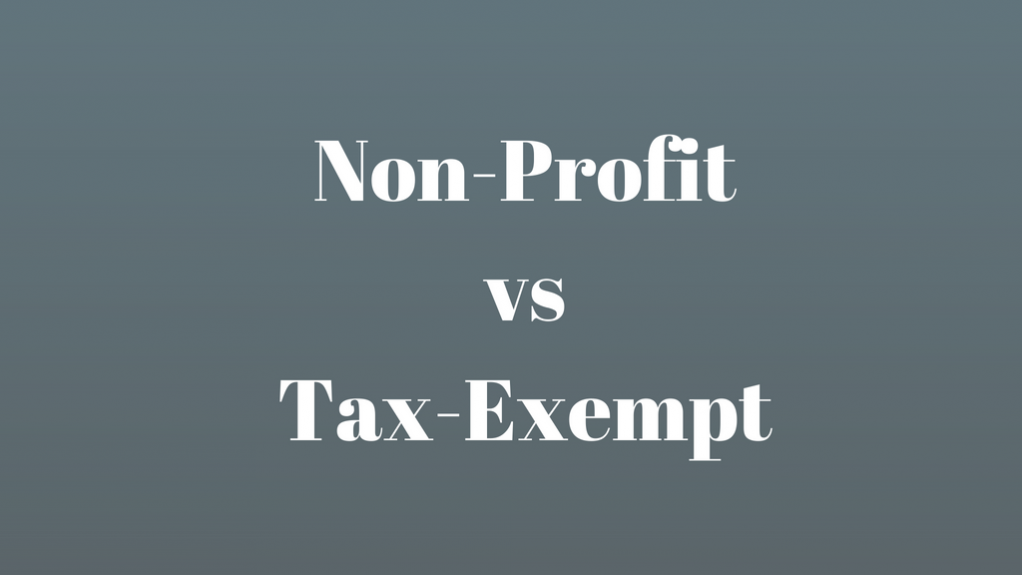When people hear the word “non-profit,” many automatically think of tax-exempt status. And while it’s true that many non-profit organizations are not required to pay taxes, these two designations are actually mutually exclusive.
To clarify, non-profit and tax-exempt are two separate classifications: “non-profit” refers to the legal status under the state, and “tax-exempt” refers to the qualification for federal income tax exemption, in accordance with the Internal Revenue Code (IRC).
What Is The Difference Between Non-Profit And Tax-Exempt?
Each individual state governs whether an entity is able to acquire a non-profit designation. Typically, non-profit organizations are formed to service a public need. Many are created with a specific cause, mission, or community service in mind.
With that said, there are several different business classifications that can qualify for a not-for-profit designation. To see the requirements in your state, you should visit your Secretary of State’s online resource to better understand the laws and local guidelines necessary to form a non-profit in your state.
Even if a business qualifies for non-profit classification under their state’s laws, they must also meet a separate set of requirements to be deemed tax-exempt. These rules are outlined by the IRS. You must file for tax exemption with both the IRS and your state.
To be deemed fully tax-exempt means that your organization is not responsible for paying federal income taxes, and also exempts you from paying some state taxes such as property and sales taxes. Furthermore, depending on the tax classification you receive, your supporters may be able to take a tax deduction for their donations to your organization. Not ever non-profit qualifies for all tax-exempt benefits.
There are 29 different types of non-profit organizations within the tax code. While most of us are familiar with the 501(c)(3) designation, which covers most charitable groups, there are dozens more.
Under the IRS, each non-profit, classified as a 501(c) followed by a number, 1-29, is held to specific tax standards, so it’s critical that you understand which filing you qualify for. The 501(c)(3) label is often the one that people want, because it confers wide tax exemption, as well as tax deductions for its donors. However, in order to qualify for 501(c)(3) status, you must meet the following requirements:
- The lawful purpose of the organization must be in one of the following categories: Educational, religious, charitable, scientific, literary, testing for public safety, fostering certain national or international amateur sports competitions, preventing cruelty to children or animals.
- Political neutrality must be explicitly stated in the organization’s filing papers, and the group must not participate in any kind of political campaign.
- The organization’s assets must not be used or distributed for the personal gain of any individual, including the founders, relatives, employees, supporters, etc…
While many non-profits may be eligible for 501(c)(3) status, some are not. Some may choose to file as unincorporated nonprofit organizations, which are typically not tax-exempt. Some may not file at all, as they may be temporary or too small.
Also, it’s worth noting that churches and other religious organizations are treated differently than most “public” charities, and depending on their structure and purpose, may be free from some of the oversight traditionally associated with tax-exempt non-profits.
Generally speaking, tax exemption allows the business to be pardoned from paying corporate taxes on income generated from activities that are “substantially related” to the purposes of the group. The tax situation may become murky for some non-profits, when they attempt to claim tax exemption on unrelated business activities, such as side jobs, which may help to fund the organization.
For any non-profit and/or charitable organization, keeping meticulous financial records is key, to avoid any mistakes on yearly filings. It’s not uncommon for charities to be audited by the IRS, thanks to the prevalence of legal gray areas when it comes to taxation.
If you are in charge of a non-profit, or are thinking of filing to form a new organization, it’s important to know the laws in your state, as well as those outlined in the IRC. Talk to a local tax attorney, or non-profit accounting specialist to learn more about your organization’s rights and responsibilities.




